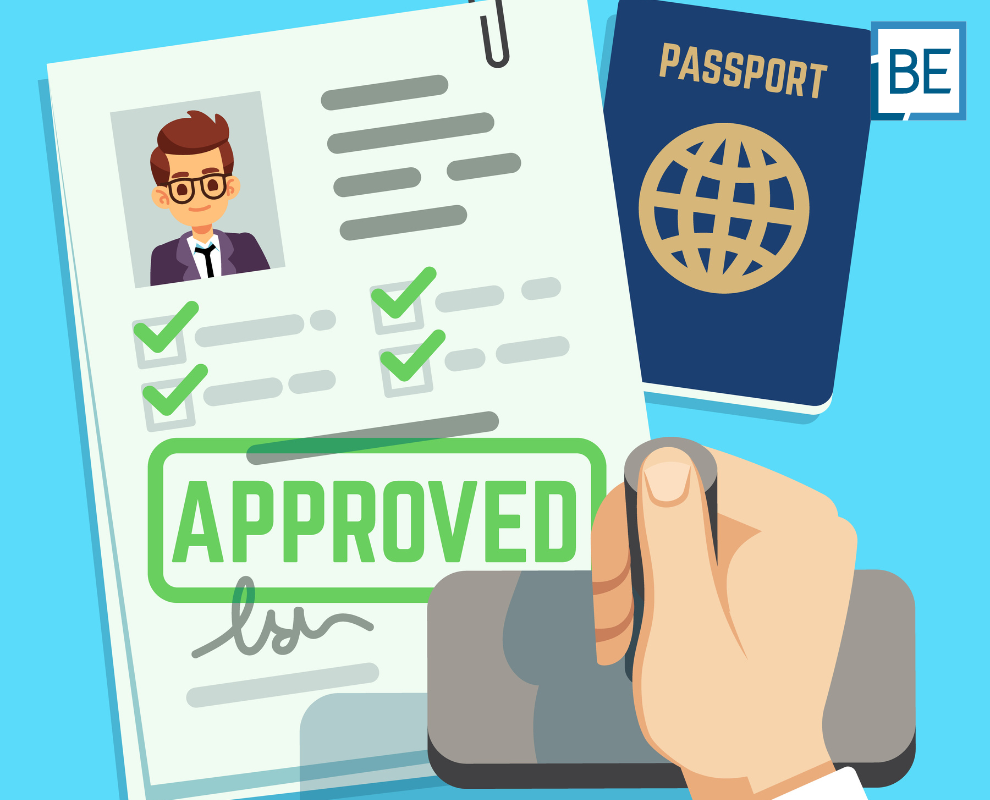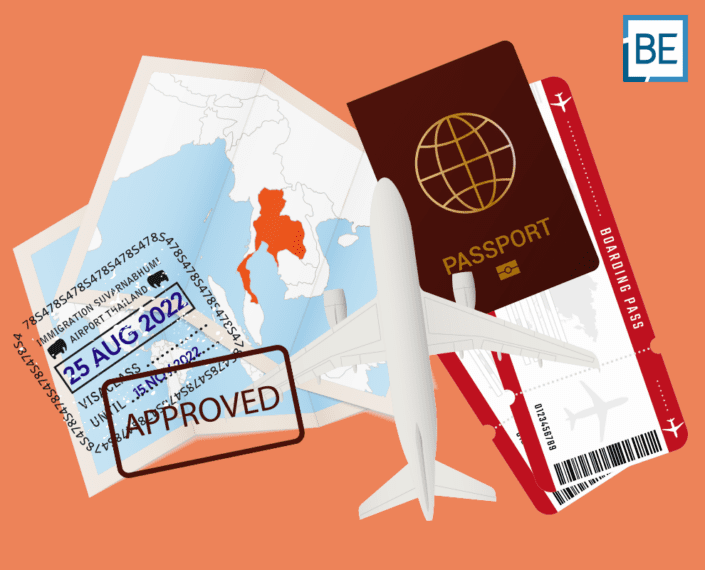Belaws Home ›› Thailand ›› Blog ›› Work permit for a foreign employee, no Thai staff required 2022
Legal
Work permit for a foreign employee, no Thai staff required 2022
Thailand has become a popular destination for foreign professionals and expats alike to come and work from. As a result, a common question our experts receive is, “how I can get a work permit in Thailand without having to hire Thai employees?”
Generally, a minimum of 4 Thai employees is required to sponsor a work permit for a foreign employee in Thailand. However, there are a couple of alternate options which remove this requirement.
Key points
- Typically, a minimum of 4 Thai employees is required to sponsor a work permit for a foreign employee in Thailand.
- A PEO allows you to register yourself or your employees with the relevant authorities using a company in Thailand as the employer of record, rather than having to register your own entity.
- Holders of the LTR will be eligible to receive a Digital Work Permit.
- SMART Visa holders are exempted from the work permit requirements.
- Representative Offices can hire foreigners with a ratio of 1 Thai employee per foreign employee (1:1).
- Companies that have received a BOI promotion, unlike other company structures, are not subject to any quotas when hiring foreign employees.
PEO Services (Sponsored Work Permit)
If you have been considering working from Thailand, your first consideration may have been setting up a company or a representative office. However, if you want to have yourself or foreign employees start to work as soon as possible or would prefer to test the market before establishing a legal entity, one alternative is to use a Professional Employer Organization (PEO) service. PEO services are also known as sponsored work permits.
PEO services provide employee management services and administrative assistance. Such services and assistance include payroll processing, onboarding, recruiting, benefits management, and HR services.
A PEO allows you to register your employees with the relevant authorities using a company in Thailand as the employer of record.
- Establish the payroll protocols, including salary amounts, Thai labour contracts, etc.
- Distribution of the monthly salaries to staff following previously agreed upon protocols.
- Organise and pay all required social insurance contributions, Withholding Tax (WHT), and personal income tax (PIT).
- Redistribute monthly reimbursements.
Opening or expanding your business on a global scale can be a difficult and complex process that can take up a lot of time and resources. This is especially true for companies that haven’t set up or established their entity in Thailand or are currently stuck in the process of trying to obtain visas and work permits for their foreign staff.
By utilizing a PEO service, companies will receive help complying with international employment laws, onboarding employees, and dealing with all necessary accounting and payroll requirements such as salary payments and tax deductions.
PEO services also grant companies far quicker access to the market than would be achieved through setting up a local entity first.
For more information about PEO services, please check out our blog post:
LTR Visa
The long-term resident visa in Thailand, also known as Thailand LTR visa offers highly skilled professionals the chance to work in Thailand.
The LTR looks to attract wealthy and professional expats to Thailand by making it easier to apply for a long-term visa. Eligible applicants can also take advantage of things such as tax benefits and reduced requirements for a work permit and holders of the LTR will be eligible to receive a Digital Work Permit.
Setting up a company in Thailand would be an attractive option for holders of an LTR who applied under the ‘Work From Thailand’ or ‘Highly Skilled Professionals’ options.
Private Limited Companies in Thailand are subject to restrictions on hiring foreign staff. Typically, you are required to hire 4 Thai employees for each foreign member of staff. This quota is not applicable to LTR visa holders.
To qualify as a ‘Highly skilled professional’, the applicant must have earned at least USD 80,000 over the past two years and have a job with a company that operates within the list of the targeted industries.
For more information about the LTR visa, please check out our blog post:
SMART visa
The SMART visa may also be a suitable option for highly skilled professionals, investors, executives, and startups who wish to work or invest in the targeted industries. SMART Visa holders are exempted from the work permit requirements.
In practice, the SMART visa, much like the LTR visa, is not a popular choice as the applicants are subject to a large number of strict conditions that need to be satisfied in order to obtain the visa.
Thai SMART visa requirements
In order to qualify for a SMART Visa S, the applicant must be able to satisfy the following criteria, in addition to having the startup project operating within the targeted industries:
- Have a fixed deposit of the equivalent of 600,000 THB (which has been maturing in the account for at three months)*.
- Have a valid health insurance policy.
- Participate in an endorsed incubation, accelerator, or similar program,
- obtain joint-venture status, or receive an endorsement from a relevant government industry.
- Establish a company in Thailand within 1 year of receiving the initial Visa. The holder must hold at least 25% ownership in the company, or be a board member of a company operating within the targeted industries.
Please note that if you’re applying for a 1-year or 2-year Visa and you plan on bringing family members as dependents, you must deposit an additional 180,000 THB, or the equivalent local currency, for each family member.
Additionally, these amounts must be deposited three months before submitting the applications. You must also hold valid health insurance policies for yourself and all members of your family for the length of the validity of your visa.
For more information, please check out our post:
SMART Startup Visa (SMART Visa S): The best Visa for entrepreneurs in Thailand?
Representative Office
A Representative Office (RO) is a suitable option for a professional who has an existing company to obtain a work permit in Thailand. Representative Offices only require one Thai employee to be hired per foreign employee. However, you must have a company registered abroad to be the head office.
Please note that a Representative Office can only perform “non-income related activities” as permissible by laws. Therefore, the Representative Office is not allowed to earn income in Thailand. The permitted activities for a Registered Office are as follows:
- Training and development;
- Technical assistance;
- Financial management;
- Control of marketing and sales promotion planning;
- Product development; and
- Research and development.
In order to establish a Representative office, a minimum capital amount of 2 million Baht is required, as per the FBA.
Click here to learn more about how to register a Representative Office in Thailand.
BOI promotions
Companies that have been approved for a BOI promotion are eligible for special incentives. The most significant of these incentives being, 100% foreign ownership of the business and reduced requirements for hiring foreign staff.
100% foreign ownership
Depending on the activities a business undertakes, it is likely that foreign ownership of a regular Thai Limited company would be limited to 49.99%. This limitation is due to the Foreign Business Act and the restrictions it places on foreign-owned companies from undertaking certain business activities.
Read more:
Understanding the Foreign Business Act in Thailand
BOI promoted companies are not subject to these restrictions and generally can be 100% foreign owned (subject to certain exceptions).
Reduced quota for hiring foreign employees
BOI promoted companies, unlike other company structures, are not subject to any quotas when hiring foreign employees. For example, Thai Limited Companies cannot hire a foreign employee unless the 4:1 quota has been satisfied.
Typically, it takes between 3 to 6 months to obtain a BOI promotion. For more information about BOI promotions, please take a look at our blog:
How can Belaws help?
Our team of immigration experts is on hand to help you make your visa applications as smooth as possible. If you are in need of assistance with regard to staying in Thailand or working in Thailand, you can browse our visa services here.
Belaws understands that visas in Thailand can often be confusing, so in order to get some more information, why not talk to one of our experts now?
Please note that this article is for information purposes only and does not constitute legal advice.
Our consultations last for a period of up to 1 hour and are conducted by expert Lawyers who are fluent in English, French and Thai.
Consultations can be hosted via WhatsApp or Video Conferencing software for your convenience. A consultation with one of our legal experts is undoubtedly the best way to get all the information you need and answer any questions you may have about your new business or project.
USD 150
Up to 1 hour
Online payment (Paypal or Credit card)
Legal consultation can be conducted in English, French or Thai
Legal consultations are handled by experienced lawyers from the relevant fields of practice
Frequently asked questions about work permits in Thailand
How much is a work permit in Thailand?
Official fees for a Work Permit in Thailand are 3,000 THB.
How long does it take to get work permit Thailand?
Once you have the correct Visa, the work permit process takes about 10 days to complete.
Are foreigners allowed to work in Thailand?
Yes foreigners can work in Thailand but they require the correct visa and a work permit to do so.
Can I change tourist visa to work permit in Thailand?
Yes it is possible but first the applicant will need to change from a tourist visa to a Non-Immigrant B visa. Once they have the Non-Imm B, they can apply for a Work Permit.
How do I get a 1 year visa for Thailand?
One year Visas are usually available for people who are employed by a Thai company, those married to a Thai national and those who hold a retirement Visa.
How can I live and work in Thailand?
In order to live and work in Thailand you need to have received a job offer from a company who can support your work permit application. Alternatively, you can open your own company in Thailand.
What type of visa is work permit?
A Work Permit is not a Visa, it is a seperate document which allows the holder to legally work in Thailand. In order to get a work permit, holders are required to obtian the relevant visa, in most cases a Non-Immigrant B visa.
How long does a work permit take to process?
Approximately 10 days
How can I get permanent residence in Thailand?
For those wishing to seek permanent residency, they must satisfy one of the following options.
- You have held a Thailand Work Visa and Work Permit for at least three years, and:
- You have an Extension of Stay based on Employment at the time of application
- You have worked at your current company for at least one year at the time of application
- You had a monthly salary of at least 80,000 Baht for two consecutive years or you filed a tax return for an annual income of at least 100,000 Baht for two consecutive years
- You have invested at least 3 Million Baht in a limited or public company in Thailand
- Family: You are a close family member of a Thai citizen (parent, child or spouse)
- Expert: You have at least a BA Degree and are employed in a position in which you have to work in for at least three consecutive years.
How can I stay in Thailand for a year?
One year Visas are usually available for people who are employed by a Thai company, those married to a Thai national and those who hold a retirement Visa.
Can foreigners become Thai citizens?
Yes, it is possible for foreigners to be able to take Thai citizenship, however, there are strict guidelines and requirements which must be satisfied.
How long can foreigners live in Thailand?
This depends on which Visa the foreigner holds. Holders of Non-Immigrant Visas based on Work, Marriage or Retirement can apply for yearly extensions of stay which can be an unlimitied amount of times (as long as they still meet the application requirements). There are also Visas which allow longer periods of stay such as the Thailand Elite Visa as well.
How much money do I need to move to Thailand?
The answer to this will depend entirely on your lifestyle, where you choose to live and your expectations.
Related articles
Subscribe today
Subscribe today
To our newsletter for all the latest legal news
in South East Asia, Belaws updates and
special promotions on our services.
To our newsletter today for all the latest legal news in South East Asia,
Belaws updates and special promotions on our services.







